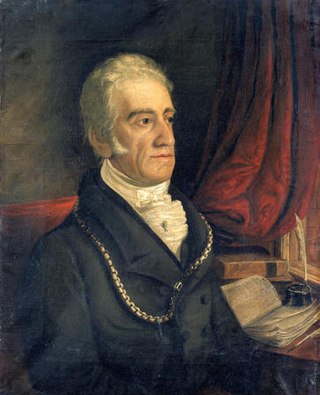Related Research Articles
This article is about the particular significance of the year 1924 to Wales and its people.

This article is about the particular significance of the year 1831 to Wales and its people.
This article is about the significance of the year 1776 to Wales and its people.
Rice Rees was a Welsh cleric and historian.

Walter Jenkin Evans was a Welsh academic who served as Principal of Carmarthen Presbyterian College and who wrote about the history and people of Unitarianism in Carmarthen.
The Dictionary of Welsh Biography (DWB) is a biographical dictionary of Welsh people who have made a significant contribution to Welsh life over seventeen centuries. It was first published in 1959, and is now maintained as a free online resource.
This article is about the particular significance of the year 1734 to Wales and its people.

William Richards was a Welsh Baptist minister; he spent much of his life in King's Lynn, in Norfolk, and wrote a history of the town. His other publications included a Welsh-English dictionary.
Evan Evans was a Welsh-language poet, clergyman, antiquary and literary critic.
William Evans, was a Welsh Presbyterian minister.

Thomas Henry was a surgeon and apothecary. He was a Fellow of the Royal Society of London, and also the father of William Henry, the chemist who formulated Henry's Law.
Titus Lewis was a Welsh Baptist minister and author. Lewis is notable for several important works, including the publication of A Welsh-English Dictionary (1805) and several volumes of hymns and biblical commentaries.
This article is about the particular significance of the year 1730 to Wales and its people.
Queen Elizabeth Grammar School Carmarthen was a selective boys' secondary school in Carmarthen, Carmarthenshire. It was founded in 1576 and closed in 1978.

William Jenkins Rees was a Welsh cleric and antiquary.

Hugh Hughes (1790–1863) was a Welsh painter, engraver and writer.
Edward Richard was a Welsh poet.

Brecon Congregational Memorial College was a Congregational college in Brecon, Powys, Mid Wales. The college graduated ministers and missionaries who were posted to Africa and India. There were classes in biblical literature, chemistry, classical languages, logic, psychology, theism, theology, trigonometry, German language, and Welsh language. The college was established in Carmarthen in 1757, and was located in Brecon from 1839. The Memorial College building in Brecon was opened in 1869. After the last principal left in 1959, the college was closed. The building is now named Camden Court and is used for sheltered housing.
James Davies was a Welsh Baptist minister from Clydey, Pembrokeshire. As a boy he attended school in Carmarthen, and services at Pant Teg Church. By 1793 he was living in the Ffynnonhenry area, and was ordained minister there in 1794, and also at Horeb church, Rhydargaeau. However, during the schism of 1799 the two churches parted company, Ffynnonhenry remaining Calvinistic, and Rhydargaeau becoming a General Baptist church under Davies's charge.
This article is about the particular significance of the year 1708 to Wales and its people.
References
- ↑ Jenkins, Robert Thomas (1959). "William Evans". Dictionary of Welsh Biography . National Library of Wales . Retrieved 10 September 2011.
![]() This article incorporates text from a publication now in the public domain : "Evans, William (d.1776?)". Dictionary of National Biography . London: Smith, Elder & Co. 1885–1900.
This article incorporates text from a publication now in the public domain : "Evans, William (d.1776?)". Dictionary of National Biography . London: Smith, Elder & Co. 1885–1900.